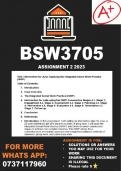, Title: Intervention for Julia: Applying the Integrated Social Work Practice (ISWP)
Table of Contents:
1. Introduction
2. Case Overview
3. The Integrated Social Work Practice (ISWP)
4. Intervention for Julia using the ISWP Consecutive Stages 4.1. Stage 1:
Engagement 4.2. Stage 2: Assessment 4.3. Stage 3: Planning 4.4. Stage 4:
Intervention 4.5. Stage 5: Evaluation 4.6. Stage 6: Termination 4.7. Stage 7:
Follow-up
5. Conclusion
6. References
7. Introduction: In this assignment, I will outline an intervention plan for Julia, a 25-
year-old lesbian girl who became a victim of gang rape. I will apply the Integrated
Social Work Practice (ISWP) and follow its seven consecutive stages to address
her complex situation. The ISWP allows for a comprehensive and holistic approach
that integrates traditional methods of casework, group work, and community work.
8. Case Overview: Julia, a young lesbian woman, suffered a traumatic gang rape by
ten men with the motive of "correcting her sexuality." Although she survived the
ordeal, she now experiences permanent emotional and psychological scars due to
being infected with HIV during the assault. Additionally, she fell pregnant with twins,
who were born healthy. However, Julia refuses to take anti-retroviral treatment
despite her HIV-positive status, leading to a decline in her health.
9. The Integrated Social Work Practice (ISWP): The ISWP is a framework that guides
social workers in providing comprehensive and coordinated support to individuals
facing complex challenges. It involves seven consecutive stages: engagement,
assessment, planning, intervention, evaluation, termination, and follow-up.
10. Intervention for Julia using the ISWP Consecutive Stages:
4.1. Stage 1: Engagement During this stage, the social worker will establish a trusting and
supportive relationship with Julia. It is crucial to approach her with empathy, sensitivity,
and respect for her sexual orientation and experiences. Building rapport will encourage
Julia to open up about her trauma and help the social worker understand her concerns
better.
4.2. Stage 2: Assessment The social worker will conduct a comprehensive assessment of
Julia's physical, emotional, psychological, and social needs. This will involve exploring the
trauma she experienced during the gang rape, her current emotional state, the challenges
she faces as a lesbian woman, and her reasons for refusing anti-retroviral treatment. The
assessment will also consider her support system, resources, and coping mechanisms.
4.3. Stage 3: Planning Based on the assessment, the social worker will collaborate with
Julia to set realistic and achievable goals. The plan will address her emotional healing,
accessing medical care for her HIV condition, exploring parenting support for her twins,
and addressing any social stigma she may encounter.




